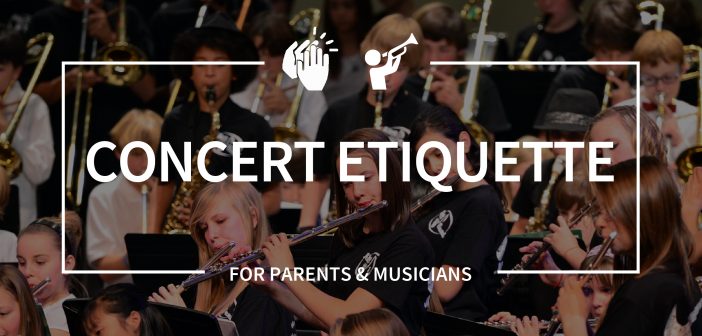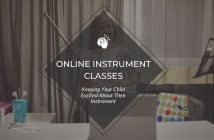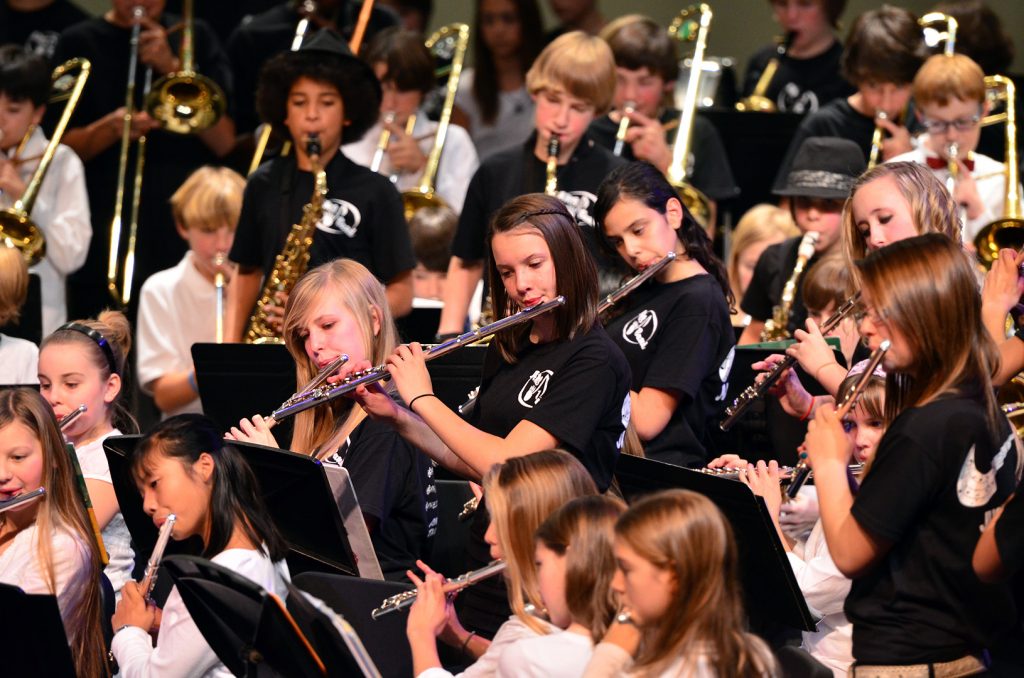
Ah, band and orchestra concerts. A culmination of hard work and steady practice. A beautiful movement of notes and harmonies from dozens of young musicians. A triumphant moment for band and orchestra directors and parents alike as their stars perform onstage.
And then, a whistle from the crowd. An ill-timed clap from a parent. A giggle from the stage.
All of a sudden, we are reminded that not everyone has been trained in proper concert etiquette. We are here to teach you how to have impeccable concert etiquette – whether you’re playing onstage or listening in the audience.
We’ll start with our young musicians.
MUSICIANS
Before The Concert
Get the Info
Be looking and listening for information from the band or orchestra director in the weeks prior to the concert. Most directors send home a sheet or email with loads of concert day details, all of which are essential.
Take note of that information. If it says to be dropped off at 5:30, be ready to leave the house with plenty of time to get you there by 5:20 (we’ll cover this later). If it specifies a certain set of clothing, check your closet or schedule a shopping trip (we’ll cover this too)!
Practice, Practice, Practice!
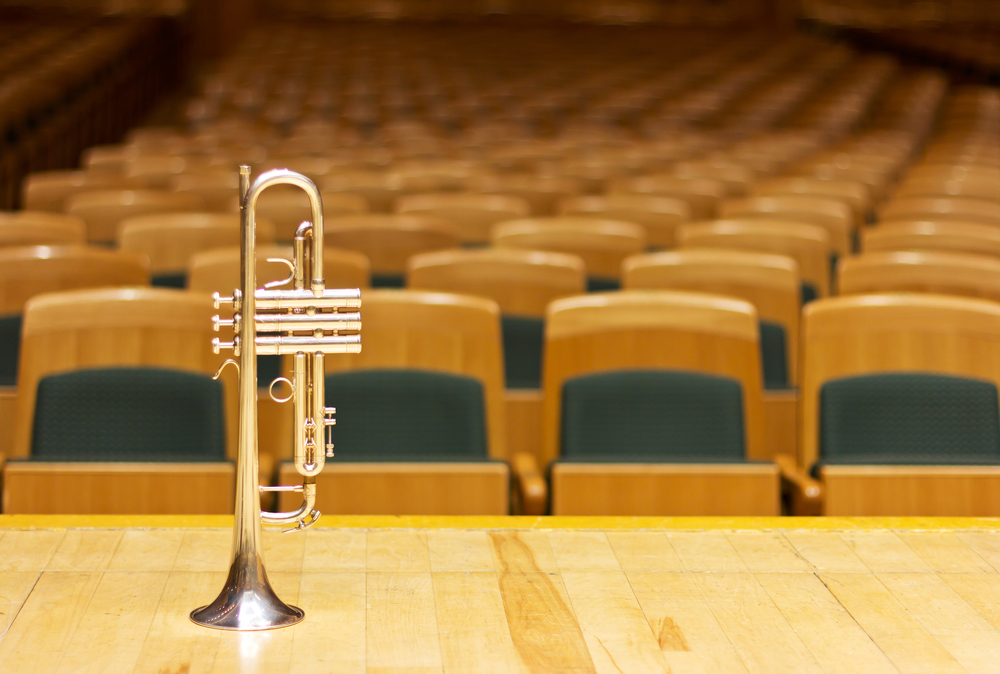
This may go without saying, but you need to make sure you practice outside of school band or orchestra. Your parents, friends, band or orchestra-mates and director are all counting on you to come prepared.
Pro Tip: If you’re feeling uneasy about a certain piece, ASK! It is a band director’s delight to help you work through those measures. Knowing you can nail those notes on concert night will be huge for your personal confidence, too!
Take note of anything that needs or will need repair in the near future. You’ll want to have that looked at before the concert. Tell your parent if this is the case!
Be There EARLY
Hear this: If you’re on time, you’re late. Please, please plan ahead so that you can get to the concert venue early. If you plan to pick up a friend, call him or her ahead of time to make sure they are ready, too!
Make sure that when you hop in the car, you have ALL of your stuff. Which leads to our next point…
Come Prepared
Extra reeds? Check. Mouthpiece? Check. Bottle of water? Check. There’s no worse feeling than getting to the concert and realizing you don’t have everything. On top of that, it’s never going to hurt to be overprepared. More times than not, you’ll be someone else’s hero for lending them something they need when they’ve forgotten something. Overpack! Be a hero!
Prepared also means knowing how to conduct yourself. Your parents and band or orchestra director may talk to you about how you should act onstage. Read through this list of 10 etiquette tips for young musicians to impress them with your etiquette knowledge.
Dress Appropriately
We can’t stress the dress enough! Make sure you are dressed correctly in accordance with your band or orchestra director’s orders.
It’s important to note that directors have a very specific reason for choosing the concert attire. The attire is chosen in such a way as to focus the audience’s attention on the music, not on the performers. Whether you love or hate the clothing your director chooses, remember this: Drawing attention to yourself is not desirable in a music setting.
After all, if you show up in blue pants when everyone else is in black, you’ll stick out like a sore thumb. Yikes.
By following your director’s orders, you allow your audience to intently and thoroughly enjoy the show.
Pro tip: Make a trip to the restroom BEFORE you’re fully dressed. That way you don’t have to wrestle with several layers or a long dress in the restroom moments before the curtains open.
During the Concert
What Not to Do: Bad Concert Etiquette
Don’t Wave
Scenario: It’s concert time and you’re in your seat, uniform crisp, music in front of you, instrument at the ready. The curtains open and you see your mom in the back.
You lift a hand and wave – even give a little “Hey, mom!” so she knows you see her. You nudge your bandmate and say, “See – that’s my mom!”
Don’t be that student.
You should never wave, gesture, or talk while onstage. Here’s how that scenario should play out instead:
The curtains open and you see your mom in the back. You try to make quick eye contact and she’s looking elsewhere. Now the director gives you the cue. ‘Oh well,’ you think to yourself, ‘I’ll just talk to her afterwards.’” You focus your attention on the director and begin to play.
See? No harm done. Let your parents spot you, while you keep your eyes on the music and your focus on the performance.
Don’t Chew Gum
Just don’t do it. Everyone can see it. And your poor instrument will suffer.
Don’t Talk Between Movements of the Same Piece
This has proven a great way to lose focus and miss a cue. We would not recommend it! You can talk all you want once the concert is over.
What to Do: Good Concert Etiquette
Do Focus Your Attention…
…Solely on the director. This is your time to shine!
Do Sit Up Straight
Sit with good posture on the edge of your chair with your feet flat on the floor. Or if you’re standing, stand tall with weight evenly distributed (and don’t lock your knees!).
Do Listen for Cues
You’ve rehearsed these a million times; this step shouldn’t be too difficult.
Do Have Fun!
You worked hard, and here you are. The feeling of satisfaction as you perform in harmony with dozens of other young musicians is a rare and beautiful one!
Your concert is your chance to shine a light on the hard work you and your ensemble have done. Make it count!
After the Concert
Be Ready for Pickup
If you’re riding home with someone, know where you are getting picked up, and be there on time!
Give a Big “Thank You!”
Thank your band or orchestra director. They worked hard for you, and vice versa. Thank them for the effort they put into your performance and the opportunity to play for them. We know firsthand how impactful a simple “thank you” can be!
Evaluate Your Performance
You may also be asked by your director to fill out a concert evaluation in the few days after the concert. In it, be honest and self-critical. Your director will also review them and give you a fair assessment of how they think you did. Once you have completed the evaluation (see sample evaluation), look for ways to improve the next time around!
PARENTS
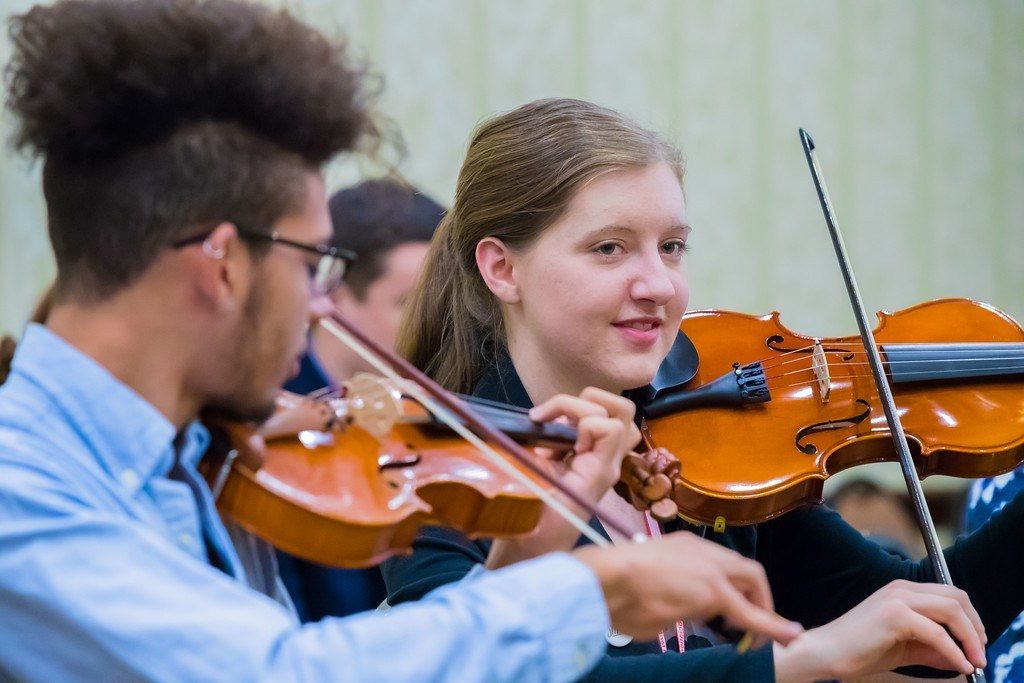
Photo credit: Matt Janson Photography, mattjanson.com via nafme.org
You may not think so, but your role as a parent is oh-so-important in your young musician’s concert preparation and performance. Here are simple ways to have proper audience etiquette before, during and after a band or orchestra concert.
One precursory plea from us to you: Parents, please show up.
We can’t tell you how often parents will just drop off their student for their concert, but not stick around to actually listen. This is extremely discouraging to a child.
Please, do everything you can to arrange your schedule in such a way that you can make it to their concerts. You’ll never regret being there on an important night in your young musician’s life.
Before the Concert
Get the Info
No surprise, your first job is the same as your child’s. We suggest being on the lookout for sheets or emails with information from the band or orchestra director, especially in the springtime or late fall (prime concert times).
Of course, you hope your dear teens and preteens are responsible enough to give you said info (and they may surprise you!). But if you haven’t heard anything within the few weeks leading up to the concert, ask other parents and check all modes of communication first. Directly asking the director should be a last resort.
Too often, parents ask first without actually looking at any material that’s been sent, whether physical or digital. Band and orchestra directors are so, so busy; humor them by doing your due diligence to get the info you need.
Tune Up Instruments
Parents, make sure your child’s instrument is working properly once you’ve gotten the concert info. If there are any adjustments or tune-ups that need to be made, schedule an appointment. (Find out about Kincaid’s repair service here.) This should be done a few weeks before the concert – don’t wait until the last minute!
Arrange Rides

You or someone you know or trust will most likely be responsible for bringing your child to the concert venue and back. If you will be unavailable for rides, please arrange rides with another young musician’s parents or trusted friend so that your child can make it on time. This goes for post-concert pickup as well.
Dress Nicely
This is a big event for your child. Make them feel special by dressing nicely. Work clothes or dressy casual wear are totally acceptable.
Educate Your Young Musician about Concert Etiquette
Start the conversation about your young musician’s conduct at a concert. It’s a new environment for many children, so having a good idea of how to conduct themselves will give them confidence. They’ll also influence their friends to behave properly.
Educating about etiquette is also a great way to advocate for your student’s music program.
During the Concert
What Not to Do: Bad Concert Etiquette
Don’t Record the Concert
There are copyright laws that could get you in big trouble for posting (let alone recording) a band or orchestra concert. Feel free to take snapshots, but do not record any of the music being played. Which leads us to…
Don’t Use Flash Photography

This should be fairly obvious. Flash is distracting to musicians and audience members. Don’t make your kid or someone else’s mess up because you didn’t have the courtesy to not use flash.
Often, a volunteer will be taking photos from a great angle in the front. Those may get emailed to you or sold on a CD.
Don’t Clap Between Movements of the Same Piece
Audience members are discouraged from clapping between movements of the same piece of music. Usually there will be a cue to clap. Often, the director will put the baton down and step off the podium between pieces.
If there is not a visual cue, check your concert program (you should be following this anyway). The program will show you when each piece of music is a movement or an entirely different work. Take the cue, don’t perform an embarrassing clapping solo!
What to do: Good Concert Etiquette
Do Silence the Cell
Please put phones, smart watches, etc. on do not disturb mode. Better yet, don’t even bring them in the auditorium! We could all use a little break from electronics once in a while. Especially in a lively, concert atmosphere!
Do Follow the Program/Clap on Cue
Follow the program so you know when to cheer for your young musician – on cue! But please clap only, no whistles or shrieks. “Wardella Whistler” and “Shouting Sherwood” are unwelcome, among other poorly-behaving guests. But if a standing ovation forms at the end, do take part!
After the Concert
Getting Your Young Musician
Pick your child up from wherever they are released. If you get a chance, congratulate and thank the band or orchestra director!
If you can’t be there, be sure to make it to the concert venue to get your child on time. Trust us, the director isn’t going to want to wait on your kid after the concert has been over for an hour. You can always arrange a ride home beforehand if needed.
WHY CONCERT ETIQUETTE MATTERS
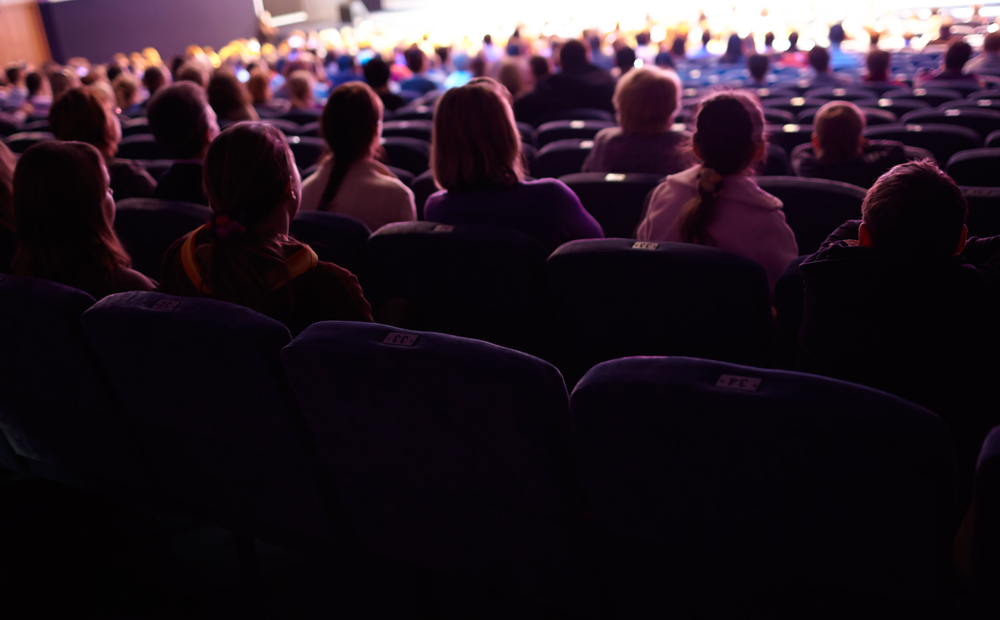
It’s so important to demonstrate proper concert etiquette, whether your child is in middle school band, high school orchestra or anything in between. If you are a young musician, your concert is your chance to shine a light on the hard work you and your ensemble have done. Make it count!
If you are a parent, this is your time to celebrate your young student’s accomplishments. Show them you care with your presence and proper etiquette.
We want to hear: What’s the worst concert etiquette you’ve ever experienced? How do you demonstrate concert etiquette? What is one tip you will use during your next performance? Band/Orchestra Directors: What is one thing you wish young musicians/parents would do to show better concert etiquette?

